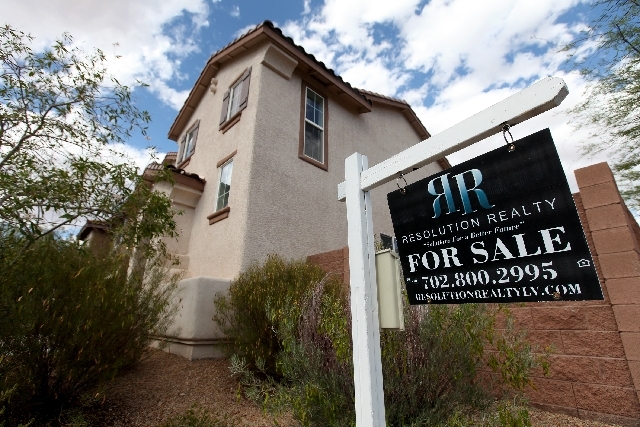Report shows Las Vegas housing stock continues to dwindle
If you’re waiting for the local housing market to return to normal, you’re going to have to wait a little longer.
A new study shows Las Vegas has once again defied real estate conventions, and the fallout could affect the city’s economy in a big way.
Spring and summer are peak seasons for home sales across the country, and that tradition shows in the latest housing-supply numbers from Zillow, an online real estate database. Sure, there is a shortage of homes for sale, with nationwide listings down 12.2 percent in early June compared with June 2012. Still, that was a gain of 5.3 percentage points over January’s year-to-year supply drop of 17.5 percent.
But locals never got the memo reminding them to sell now. So Las Vegas, which has struggled since early 2011 with low housing supply, took another step back in the first half of 2013. Area listings plummeted 55.2 percent year over year in early June, a big deterioration measured against January’s 33.4 percent falloff. That means local listings lost 21.8 percentage points of ground, even as the nation’s supply crunch eased. Housing stock retreated the most — 64.3 percent — in the middle tier of homes, priced from $106,950 to $194,250.
The market now has 1.2 months of supply, according to local housing research firm SalesTraq. A normal inventory would be six months’ worth.
Low housing supply has important effects on the broader economy. Too few homes on the market can push up prices dramatically — the median resale price jumped 34.1 percent year over year in April, to $143,500, SalesTraq said Wednesday — and that’s good for sellers, who can get more for their home. It also creates a wealth effect that buoys local consumer spending, as people feel better about their net worth, said Svenja Gudell, a senior economist with Zillow.
For buyers, though, surging prices equal lower home-purchasing power and a bigger monthly mortgage payment, which hurts discretionary income. What’s more, stiff competition for a place to live is turning away retirees and others who want to relocate here, said Richard Lasica, a Realtor with Realty Executives. That feeding frenzy is especially evident in the midprice tier, where cash investors make up as much as 75 percent of buyers, Lasica said.
“People are trying to move here, and they can’t buy property. That can’t be good for our economy,” he said.
In the face of skyrocketing prices, the supply trend defies economic logic, experts agreed.
Foreclosures aren’t the biggest surprise. They’ve been falling sharply since a 2011 state law slowed the repossession process. Plus, homebuilders have been unable to help close the supply gap because they’re already working at capacity given constraints in manpower and land, said Nat Hodgson, executive director of the Southern Nevada Home Builders Association.
New home sales were up 85.7 percent year over year in April, SalesTraq reported, but the 650 units closed fell well below the 3,000-plus homes sold each month at the market’s 2006 peak.
So why aren’t homeowners boosting supply with resales? After all, prices have jumped roughly 30 percent year to year for much of 2013. Typically, when that happens, people decide to sell, Gudell said.
They aren’t listing in Las Vegas, though.
That is partly because most of the market is still underwater, Gudell said. The share of households with negative equity has retreated considerably since fourth-quarter 2011, when Zillow pegged it at
70 percent. Yet, 54.3 percent were still upside down in the first quarter.
“When you have a majority of homeowners underwater, it’s an extreme constraint on the housing market,” Gudell said. “Those folks can’t sell their house even if they want to, unless they can bring money to their closing. For a lot of homeowners, selling is not an option, and they have to ride out the market until they have some equity.”
And then there are the homeowners who want to ride out the market in search of even better times.
“People may think this appreciation is going to continue for quite a while, and maybe they are waiting until it reaches a certain number they want,” Lasica said.
It could be a dangerous game, he said.
As long as 60,000 homes sit vacant, it’s hard to predict what might happen to inventories and prices in the next year. Few experts say prices will continue to surge at current levels for much longer. Zillow’s analysis calls for appreciation to slow down to less than 10 percent from April 2013 to April 2014. Lasica said he expects inventory to start growing by early 2014, as more people build equity in coming months and do finally sell out.
“This market has been very volatile over the past 10 years, and things could change in a heartbeat,” Lasica said.
“If you can afford to wait, it might be a valid strategy. But if you’re gambling in a casino, and you’re losing $500, and all of a sudden you’re back to winning by $5, do you risk it and keep going, or do you say, ‘I got lucky here, and breaking even is OK?’ ”
Contact reporter Jennifer Robison at jrobison@reviewjournal.com or 702-380-4512. Follow @J_Robison1 on Twitter.






















